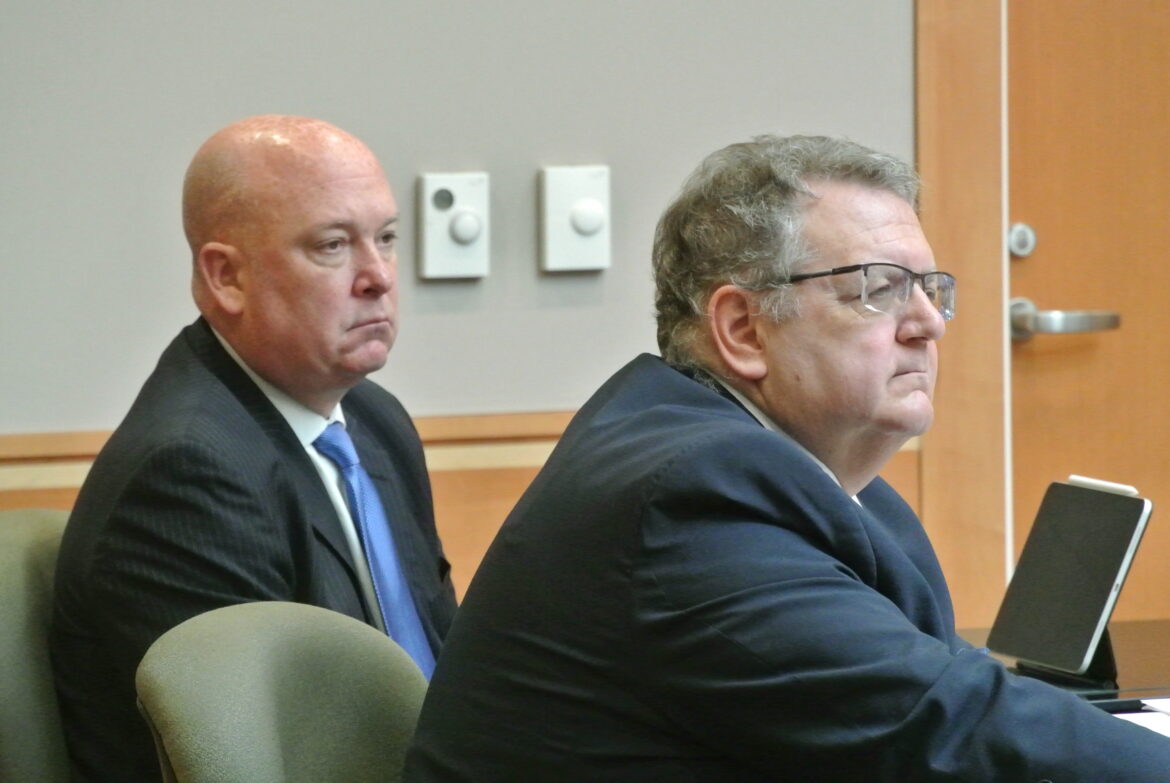By DAMIEN FISHER, InDepthNH.org
MANCHESTER — A three-year-old search warrant affidavit from the early days of the criminal investigation into the Sununu Youth Services Center, also known as YDC, abuse case is so secret that the judge overseeing the criminal cases has still not seen it.
Hillsborough Superior Court Judge – North Judge William Delker presided Monday over a hearing to determine whether he will make that document, and other search warrant affidavits created by YDC Task Force investigators public. The hearing played out a bit like a law school graduation mixer, the courtroom packed with congenial lawyers reminiscing and catching up with each other even though they are representing victims, defendants and the state.
But also in the courtroom were about half a dozen survivors of the physical and sexual abuse allegedly perpetrated by YDC staff. These men and women survived beatings, rapes, and other horrors as children while wards of a state whose leaders turned a blind eye to the culture of abuse and fear, according to court records.
While lawyers for the victims, David Vicinanzo and Rus Rilee, are pushing to get the affidavits released to the public, defense lawyers and state prosecutors are united in opposition, arguing to keep the public in the dark about the investigation that could end up costing New Hampshire hundreds of millions in settlement awards. Delker expressed skepticism that the affidavits should stay locked up under court seal, though he has yet to issue an order.
“We don’t litigate in secret in this state,” Delker said.
Delker seems to agree with Vicinanzo and Rilee that state law, case law precedent, and the New Hampshire Constitution all demand that these affidavits become public records available to any member of the public. Assistant Attorney General Meghan Hagaman said making the affidavits public could impair the prosecution of the 11 men indicted for the abuse, and it could impair future prosecutions of other YDC suspects by influencing witnesses and potential jurors who might read the affidavit.
“There is no way to protect what information is out there unless it’s sealed,” Hagaman said.
However, sealing affidavits is not normal in New Hampshire courts, Delker said repeatedly during the hearing. While Hagaman said the ongoing investigations into the abuse could be put at risk, Vicinanzo countered that the Task Force investigation is dormant and investigators no longer respond to victims who report their abuse.
Hagaman acknowledged that the Task Force is no longer focused on investigating the abuse, but is instead prepping for criminal trials. Even though the investigation is still open, they have largely reallocated staffing away from the investigation, she said. The last indictments were handed up in 2021 and there are 11 men set to eventually go to trial. There are potentially hundreds more suspects identified in the civil lawsuit who have yet to be charged.
Rilee and Vicinanzo accuse the state of trying to hide the affidavits, which should already be public, because they will show the state’s complicity in the abuse.
Richard Guerriero, a defense lawyer for YDC abuse suspect James Woodlock, accused Vicinanzo and Rilee of using the release of the affidavit to aid their civil lawsuits against the state by generating negative public opinion against the state. Rilee and Vicinanzo are already cleared to use a redacted version of the sealed affidavit in the first civil trial, which starts next month in Rockingham Superior Court.
“Whatever interest they have beyond that is an effort to influence the public in general,” Guerriero said. “The defendants’ right to fair trials is of greater interest than their interest to influence the public.”
Guerriero argued that given the intense publicity around the YDC case, the state needs to protect the rights of the suspects by keeping the information sealed.
But Delker noted the Harmony Montgomery murder trial was a national news story that was not slowed by public information. That case saw the release of a grisly and disturbing affidavit detailing Adam Montgomery’s murder of his daughter months before the trial, and the state did not seem to have a difficult time finding impartial jurors.
“I read the Adam Montgomery affidavit online. How is that any different from any other case that gets that kind of attention,” Delker asked.
Guerriero said the survivors and their attorneys want to have the suspects convicted in the court of public opinion in order to secure monetary damages in the civil trials.
“Their common interest is in getting the public to accept these accusations as truth,” Guerriero said.
But Delker still seemed to tilt toward transparency.
“Don’t we also have an interest in holding the government accountable?” Delker asked.
Delker will review the sealed affidavits before coming to a decision. His ruling will likely allow some portions of the documents to be redacted before it is made available to the public.






